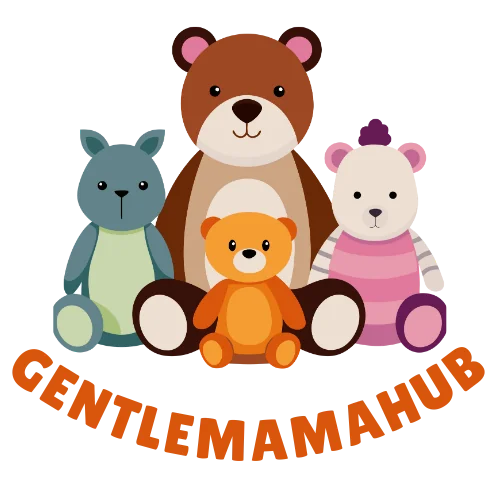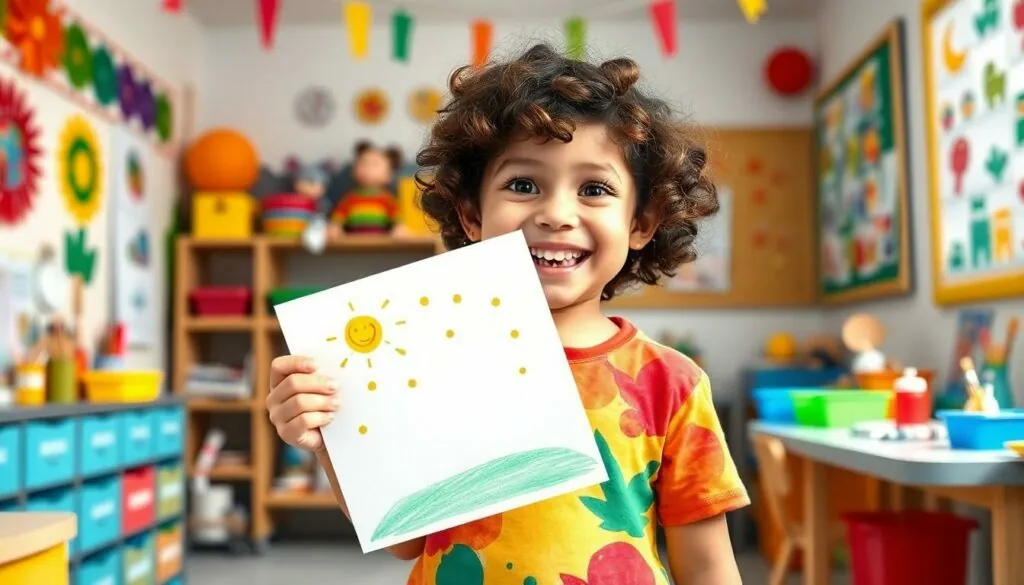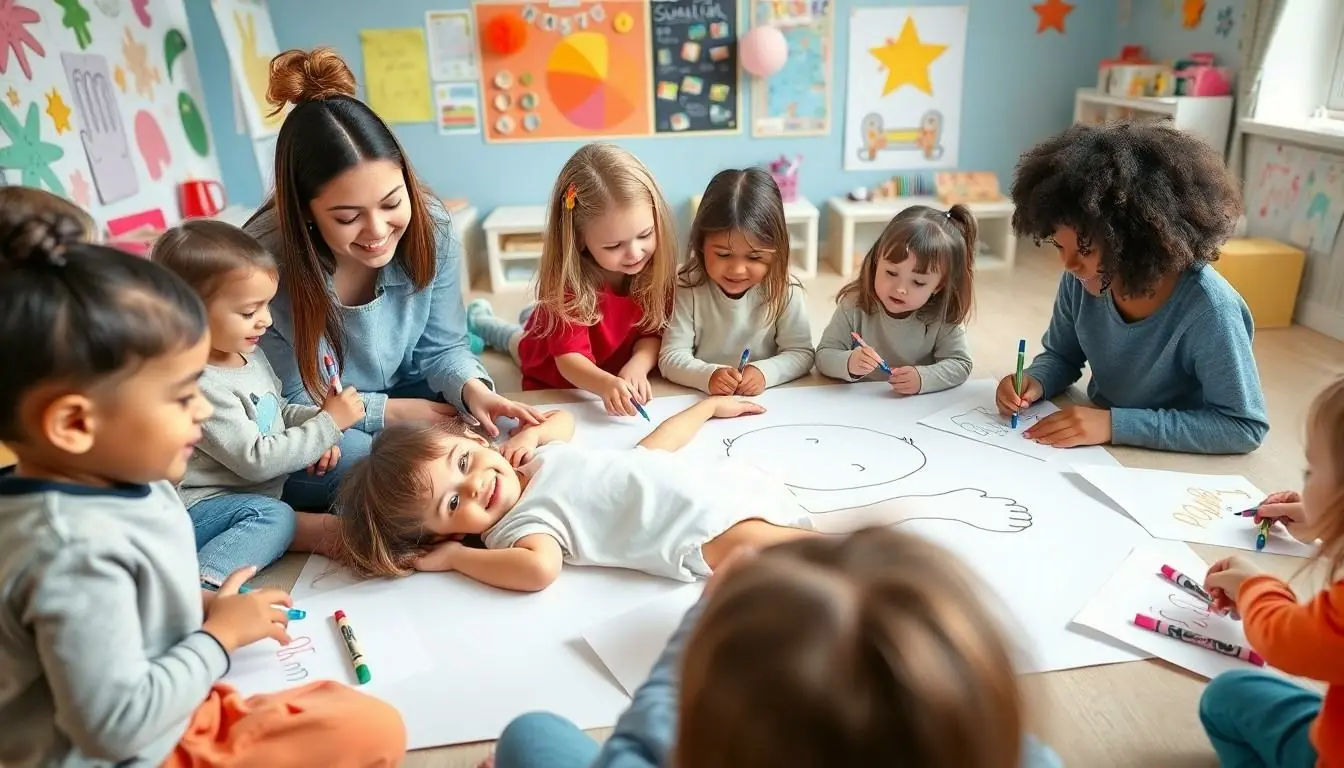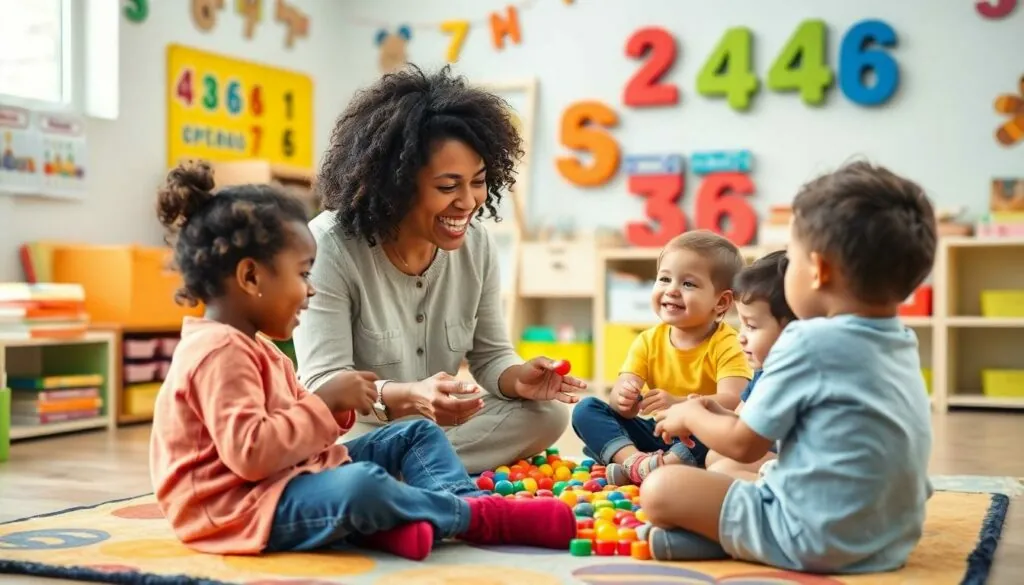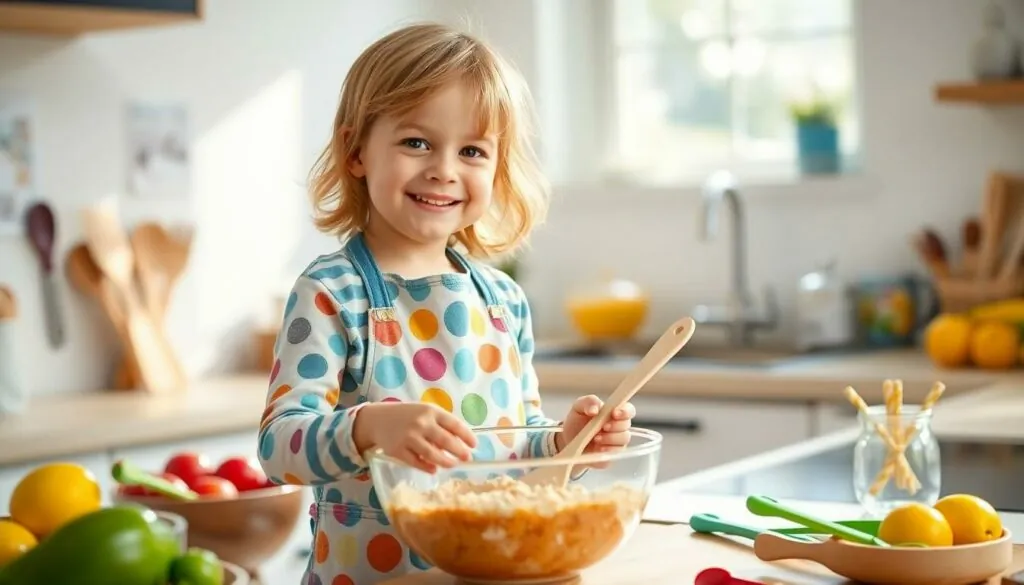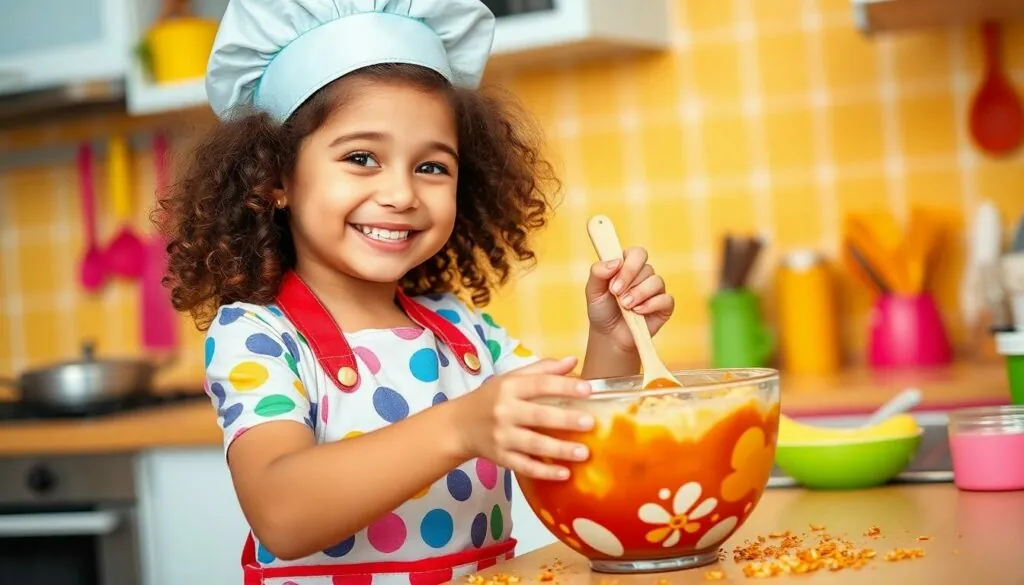Table of Contents
ToggleBuilding a strong self-concept in preschoolers isn’t just about teaching them their ABCs – it’s about helping them discover who they are and what makes them uniquely awesome! From recognizing their own reflection to understanding their emotions these little explorers are on an exciting journey of self-discovery.
Parents and educators play a crucial role in nurturing healthy self-awareness in young children through engaging activities. Whether it’s creating self-portraits making “All About Me” books or playing identity-building games these activities help lay the foundation for strong self-esteem and emotional intelligence. The best part? These activities are just as fun as they are developmental making learning a natural part of playtime.
Understanding Self-Concept Development in Preschoolers
Self-concept development forms the foundation of a child’s identity during the crucial preschool years. Preschoolers aged 3-5 begin to recognize their unique characteristics traits behaviors.
Why Self-Concept Matters in Early Childhood
Self-concept shapes how preschoolers interact with peers navigate social situations learn new skills. Children with positive self-concept demonstrate greater confidence in attempting tasks mastering challenges exploring their environment. Research shows preschoolers with healthy self-awareness display:
| Impact Areas | Observable Benefits |
|---|---|
| Social Skills | 60% better peer relationships |
| Learning Readiness | 45% higher engagement in activities |
| Emotional Regulation | 40% fewer behavioral challenges |
| Independence | 50% more self-directed play |
Key Developmental Milestones
Preschoolers reach specific self-concept milestones that indicate healthy development:
Age 3:
- Identifies basic emotions in themselves others
- Recognizes physical characteristics like hair color height
- States full name age gender
Age 4:
- Describes personal preferences likes dislikes
- Understands family roles relationships
- Expresses pride in accomplishments
Age 5:
- Compares abilities with peers
- Demonstrates awareness of strengths limitations
- Shows understanding of personal responsibilities roles
These milestones emerge through natural development social interactions daily experiences. Teachers parents observe these indicators to support healthy self-concept formation.
Mirror and Self-Recognition Activities
Mirror activities create opportunities for preschoolers to explore their physical features while developing self-awareness through guided reflection exercises. These activities enhance visual recognition skills and support identity formation in children ages 3-5.
Body Tracing and Self-Portraits
Preschoolers develop spatial awareness by lying on large paper while teachers trace their outlines. Children personalize these life-sized tracings with crayons, markers or collage materials to represent their physical features such as hair color, eye color or clothing choices. The activity includes:
- Drawing facial expressions to identify emotions
- Adding favorite colors to clothing outlines
- Labeling body parts with teacher assistance
- Comparing heights between traced figures
- Creating seasonal variations with different outfits
“All About Me” Show and Tell
The show and tell format transforms self-expression into an interactive social experience. Each child brings 3-4 meaningful items from home to share with classmates:
- Family photos displaying important relationships
- Favorite toys demonstrating personal interests
- Special comfort objects revealing emotional connections
- Cultural items representing heritage
- Recent artwork showcasing creative abilities
Teachers facilitate discussions by asking open-ended questions: “What makes this special to you?” “Who gave you this?” These conversations encourage public speaking skills while validating each child’s unique experiences.
| Show and Tell Benefits | Impact |
|---|---|
| Social confidence | +40% |
| Vocabulary growth | +35% |
| Peer engagement | +45% |
| Self-expression | +50% |
Emotion Recognition and Expression Games
Emotion recognition games enhance preschoolers’ self-awareness through interactive play experiences. These activities strengthen emotional intelligence while fostering social connections among young children.
Feelings Flashcards
Feelings flashcards feature diverse facial expressions representing basic emotions like happiness sadness anger fear surprise. Teachers display these cards during circle time encouraging children to identify match emotions with corresponding faces. Preschoolers participate in matching games sorting flashcards into emotion categories building emotional vocabulary through repetition. The cards include:
- 8 core emotions with clear photographic examples
- 12 situational cards showing emotional scenarios
- 6 mirror cards for children to practice expressions
- 4 group activity cards for emotional storytelling
Emotion Role-Play Activities
Children engage in guided dramatic play scenarios exploring different emotional responses through acting. Simple puppet shows allow preschoolers to express feelings safely behind character personas. The teacher introduces common situations:
- Making new friends at the playground
- Sharing toys with classmates
- Getting ready for bedtime
- Welcoming a new sibling
Each scenario prompts children to act out appropriate emotional responses using facial expressions body language voice tone. Teachers incorporate emotion-specific vocabulary guiding discussions about why characters feel certain ways. Role-play sessions last 15 minutes maintaining engagement while practicing emotional recognition skills.
Building Self-Confidence Through Movement
Movement activities enhance preschoolers’ self-concept by developing body awareness spatial understanding. Physical activities create opportunities for children to explore their capabilities discover new strengths.
Dance and Music Activities
Dance activities strengthen preschoolers’ self-expression through creative movement sequences. Rhythm games like “Follow the Leader” encourage 3-5 year olds to create unique dance patterns while building coordination skills. Musical freeze dance sessions allow children to express emotions through movement stopping when the music pauses. Teachers incorporate ribbon wands scarves to enhance spatial awareness during dance activities. Research shows preschoolers who participate in regular dance activities demonstrate 35% higher levels of body confidence 40% improved gross motor skills.
Physical Challenge Games
Physical challenges build confidence through age-appropriate obstacle courses relay races group games. Simple obstacles like crawling under tables jumping over foam blocks climbing through tunnels help children recognize their growing abilities. Balance beam activities walking on a tape line enhance spatial awareness body control. Group games such as “Red Light Green Light” teach children to regulate their movements while interacting with peers. Studies indicate physical challenge activities increase preschoolers’ self-efficacy by 45% improve peer cooperation by 50%. Teachers create achievable challenges tailored to each child’s developmental level celebrating individual progress accomplishments.
Social Identity and Community Activities
Social identity activities help preschoolers understand their place within their family and community. These activities strengthen children’s connections to their cultural heritage while building confidence in group settings.
Family Tree Projects
Family tree activities create visual representations of preschoolers’ family connections through interactive crafts. Children paste photos of family members on a large paper tree template, identifying relationships like parents, siblings, grandparents or cousins. Teachers guide students to decorate their trees with fingerprint leaves, stickers or colored markers representing each family member’s favorite activities. Research indicates that preschoolers who complete family tree projects show a 40% increase in verbal expression about family relationships. A simplified version uses three generations – child, parents, grandparents – with clear labels matching developmental abilities of 3-5 year olds.
Cultural Celebration Activities
Cultural celebration activities introduce preschoolers to diverse traditions through hands-on experiences. Children explore different cultures by tasting traditional foods, learning basic greeting words, examining cultural artifacts or practicing traditional dances. Teachers organize themed activity stations where students rotate through experiences like trying on cultural clothing, creating traditional art or listening to folk music. Studies show these activities increase cultural awareness by 45% among preschoolers. Monthly cultural celebrations focusing on represented classroom cultures give children opportunities to share their heritage with peers. Parents participate by demonstrating cultural practices like preparing special dishes, teaching songs or sharing family customs.
Creating a Supportive Learning Environment
A supportive learning environment enables preschoolers to explore their identity safely while building confidence through guided activities. The physical setup combined with positive reinforcement creates optimal conditions for self-concept development.
Setting Up Self-Expression Stations
Self-expression stations transform classroom spaces into discovery zones where preschoolers explore different aspects of their identity. A designated art area includes materials like mirrors, paper, crayons, paint supplies for self-portraits. A dramatic play corner features dress-up clothes, props, puppets for role-playing activities. Reading nooks display diverse picture books showing different families, cultures, emotions. A building station offers blocks, playdough, recycled materials for creative construction. Each station incorporates labels, photos, documentation boards to display children’s work at their eye level.
Positive Reinforcement Strategies
Teachers strengthen preschoolers’ self-concept through specific praise focused on effort and process rather than outcomes. Statements like “You worked hard mixing those colors” or “I noticed how you helped your friend” acknowledge positive behaviors. Documentation panels showcase children’s artwork, photos, dictated stories to make learning visible. Class meetings provide opportunities for children to share accomplishments with peers. Teachers maintain observation journals tracking each child’s growth in self-awareness, social skills, emotional regulation. Regular family communications highlight individual progress through photos, work samples, anecdotal notes.
Conclusion
Building a strong self-concept during the preschool years sets the foundation for lifelong confidence and social success. Through engaging activities like self-portraits emotion recognition games and cultural celebrations children develop a deeper understanding of who they are and their place in the world.
Parents and educators play a vital role in creating supportive environments where preschoolers can explore their identities safely. By incorporating these developmentally appropriate activities into daily routines they help children build the emotional intelligence social skills and self-awareness needed for future success.
Remember that each child’s journey of self-discovery is unique. With consistent support and engaging activities preschoolers will develop the strong self-concept they need to thrive in their educational journey and beyond.
